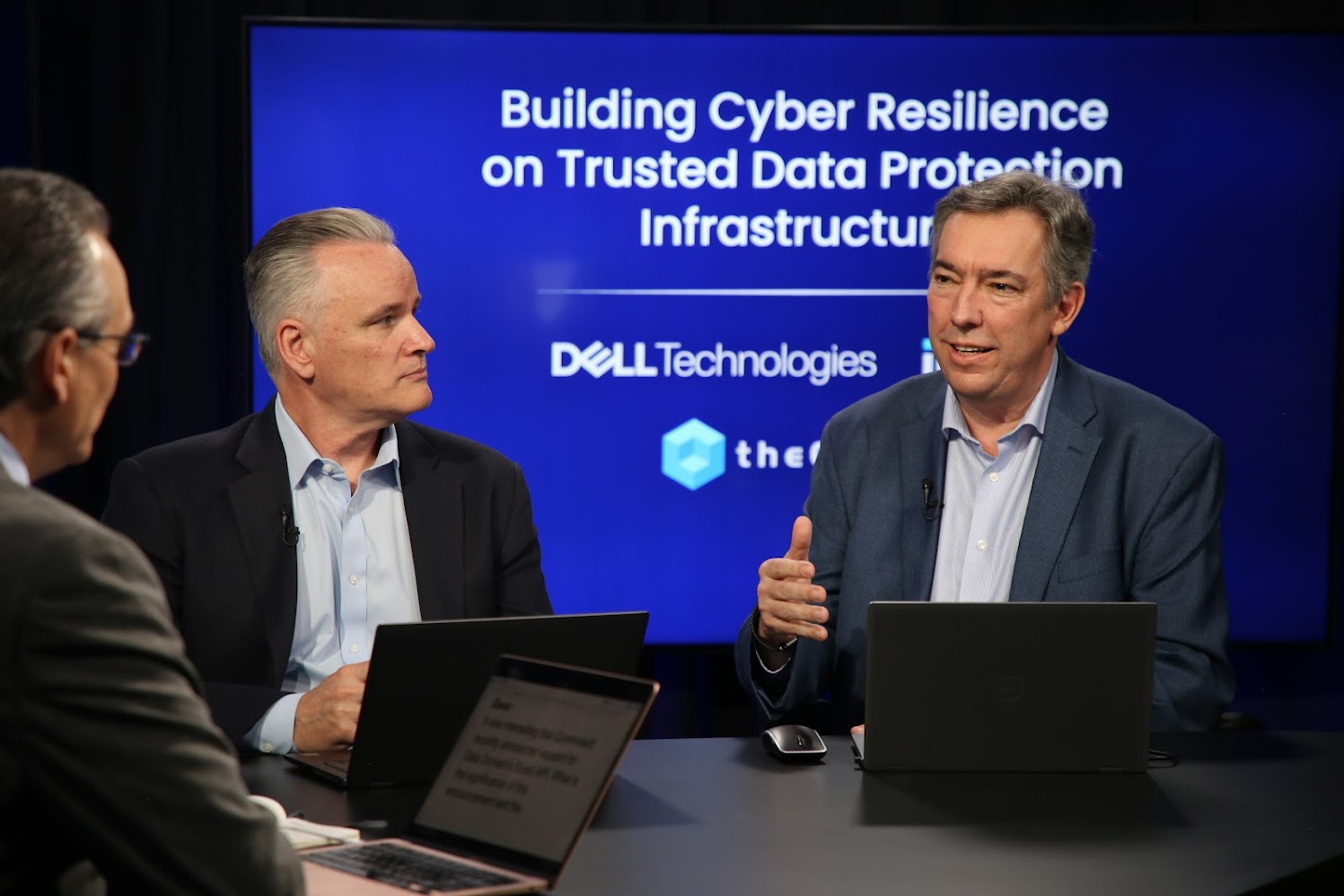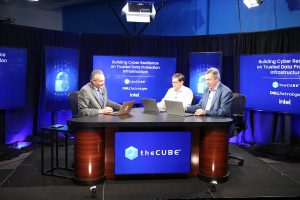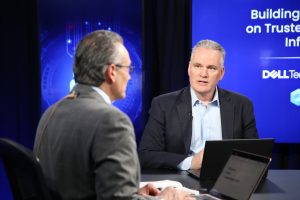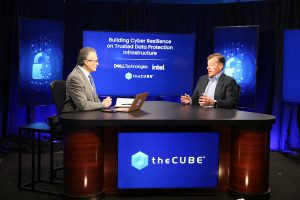 SECURITY
SECURITY
 SECURITY
SECURITY
 SECURITY
SECURITY
Dell Technologies Inc. took several major steps at the end of April to help customers build a modern cyber resilient foundation in the face of mounting cyberattacks.
The company expanded its data protection portfolio of appliances, software and as-a-service AI offerings with the goal to create a resilient infrastructure that can protect critical data on-premises, in the public cloud and at the edge. The latest portfolio enhancements were announced on April 30 as part of Dell’s “Building Cyber Resilience on Trusted Data Protection Infrastructure” launch event, during an exclusive broadcast on theCUBE, SiliconANGLE Media’s livestreaming studio.
“Cyber resilience has become a mainstream phrase among technology professionals,” said theCUBE research analyst Dave Vellante at the start of the broadcast. “Almost every day we’re reminded in the news of security breaches. Resilient infrastructure is at the core and can increase board-level confidence that continuous innovation can take place amid ever-escalating cyber threats, multicloud complexity and a rapidly evolving technology landscape driven, of course, by the AI revolution, which is taking place before our eyes.” (* Disclosure below.)
Here are three key insights you might have missed during the event:
Dell’s latest releases included the introduction of APEX Backup Services AI, an integrated generative AI assistant for data backup and recovery.

Dell’s Travis Vigil and Rob Emsley talk with theCUBE’s Dave Vellante about cyber resilience.
“It allows customers to make their data protection processes more streamlined and effective,” said Travis Vigil, senior vice president of product management at Dell Technologies, in an interview on theCUBE. “In particular, the capability offers interactive reporting for real-time custom reports and suggestions, it offers assisted troubleshooting through guided steps and real-time advice. And it offers intelligent responses with recommendations and best practices.”
Dell’s AI-powered enhancements follow a four-pronged approach, called “AI-In, AI-On, AI-For, AI-With,” that the company unveiled in May 2022.
“AI-In ensures that we are building AI into our products,” Vigil said. “AI-On means that we are providing server storage networking infrastructure for customers to run their generative AI infrastructure on. AI-For is how we within Dell are using generative AI to modernize our processes and procedures. AI-With is partnering with technology providers and software providers, models providers, to bring an end-to-end ecosystem to help customers deploy generative AI on-premises.”
Dell’s approach is also crafted to address an important trend in the cybersecurity world. As customers increasingly adopt AI-based workloads, this is creating a new area of vulnerability that will need protection.
“AI workloads and the infrastructure that is used to run them are just another attack surface that bad actors can go after,” said Rob Emsley (pictured, right), director of data protection marketing at Dell Technologies, during an appearance on the broadcast. “You need to protect it in the same way that you protect the rest of your critical application data, whether it be training data, the models, the output data, whether it be on-prem, in the public cloud or at the edge. That’s something which is a real big focus for us as we go forward.”
Here’s theCUBE’s complete video interview with Travis Vigil and Rob Emsley of Dell Technologies:
Dell’s enhancements for its PowerProtect Data Domain and Data Manager, along with the APEX Backup Services offerings, underscore a desire on the part of its customers for multicloud support, according to Rich Colbert (pictured, left), field chief technology officer of Dell Technologies, in an interview during the event.

Dell’s Rich Colbert talks with theCUBE’s Dave Vellante about Dell’s multicloud support solutions.
“APEX Backup Services is a big part of our multicloud posture, it allows us to reach workloads like Microsoft 365 and Google Cloud,” he said. “It’s also a great SaaS-based offering for things like edge locations and smaller data centers, and it is growing. But all of our data protection technology, the PowerProtect Data Domain platform in its virtual form, as well as Data Manager, are also available in the public cloud.”
Dell has structured its latest releases to accommodate a wide range of customer situations, recognizing that clients would want to gain access to a simpler modern platform as part of their existing relationship with Dell. The company built unique IP for Data Manager with Transparent Snapshots to accomplish this, along with tools for the transition from legacy platforms.
“Because we knew where [customers] were and where we wanted them to go, we were able to do tooling to help them transition their policies, their agents from older technologies that many of them are still using, to the modern platform as part of our overarching strategy to move them forward in the future,” said Dell’s Emsley, who also appeared with Colbert during the interview on theCUBE.
Another key element in Dell’s rollout of new data protection solutions is integration with industry partners. Commvault Systems Inc. recently announced an integration with its data protection software by incorporating the Data Domain Boost SDK into Commvault’s platform.
“It was really customer driven,” Colbert said. “Customers had Commvault and Data Domain, they had experience with both, and they realized that working the two of them together in a kind of non-integrated fashion wasn’t living up to their expectations. This integration actually helps drive the simplicity and really maximizes what both solutions can do.”
Here’s theCUBE’s complete video interview with Rich Colbert and Rob Emsley of Dell Technologies:
In an interview during the Dell event, Christophe Bertrand, practice director of data management and analytics at Enterprise Strategy Group, presented recent survey results that showed a definitive shift in organizational thinking about disaster recovery. When asked if an organization considered recovery from a cyber event to be fundamentally different from recovering from a traditional outage or disaster, nearly 70 percent of respondents answered “yes.”

ESG’s Christophe Bertrand analyzes the data around current enterprise data protection.
This indicated a change in how increased threats and successful ransomware attacks have transformed perspectives on traditional business recovery methods.
“I like to say that disaster recovery is dead, now we’re really in the era of cyber recovery and cyber resilience,” Bertrand said. “It’s not just marketing buzz or vendors making pivots and messaging and PR. This is real.”
This shift is leading many organizations to rethink their recovery process. In the past, it was fairly straightforward to predict when a hurricane was about to strike and disrupt business operations. Yet no one can predict the next successful breach or ransomware attack.
“You don’t know what’s going to hit you, you don’t know how it’s going to hit, you don’t know when,” Bertrand noted. “Could be bad, could be really bad, could be benign. The processes have to change; the teams have to change.”
This dynamic is leading to a fresh look at AI and its potential to provide the kind of resilience necessary to protect exploding amounts of data in an ever-more complex IT environment.
“It’s just too much data, processes are very complex, and the nature of the people operating the environment has changed,” Bertrand said. “You have to have those tools, and I think generative AI and AI in general in data protection is absolutely key. That’s going to be, in my opinion, what makes a difference in the future between the vendors who win and the vendors who do not.”
Here’s theCUBE’s complete video interview with Christophe Bertrand:
Watch theCUBE’s full episode of Dell’s “Building Cyber Resilience on Trusted Data Protection Infrastructure” event here:
(* Disclosure: TheCUBE is a paid media partner for the “Building Cyber Resilience on Trusted Data Protection Infrastructure” event. Neither Dell Technologies Inc., the sponsor of theCUBE’s event coverage, nor other sponsors have editorial control over content on theCUBE or SiliconANGLE.)
THANK YOU